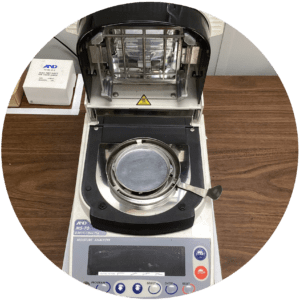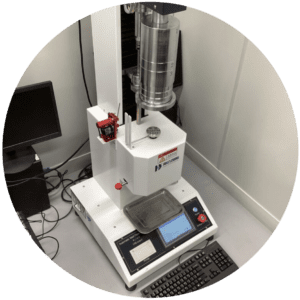STEVESTON, BC – Ocean Legacy Foundation (Ocean Legacy) is proud to announce the launch of new, affordable plastic testing and production support services. Starting today, (July 3, 2024) local recyclers, startups, and amateur material developers will have access to high-quality melt flow and moisture testing at their Steveston Facility.
This lab is part of Ocean Legacy’s EPIC Plastic Pollution Emergency ResponseTM program, which takes a four-pillar approach to mitigate, prevent, respond to and recover plastic waste from entering tributary and marine ecosystems. The four pillars are Education & Research, Policy & Advocacy, Infrastructure Development, and Cleanup & Restoration (“EPIC”). The lab was made possible due to the generous support of the provincial Ministry of Environment and Climate Change Strategy through the CleanBC Plastic Action Fund. It represents a significant enhancement to Ocean Legacy’s capabilities, aligning with the organization’s EPIC pillars to bolster the plastic circular economy. These services are designed to support essential plastic physical property testing at accessible prices to empower those looking to use plastic recycled content in their products, the ability to gather critical performance data.
“People can celebrate this work that helps preserve the health of our environment and marine ecosystems for generations to come,” said George Heyman, Minister of Environment and Climate Change Strategy. “Ocean Legacy’s project as well as work completed to date is a great example of how the CleanBC Plastic Action Fund supports companies to reduce plastic waste and use more recycled products.”
 About the Plastic Lab Services
About the Plastic Lab Services
The melt flow analysis offered by Ocean Legacy helps determine extruder parameters, compounding ratios, and the best use cases for recycled materials. Understanding the melt flow characteristics of plastics is crucial for optimizing production processes and improving material performance. In addition, the moisture analysis service provides critical insights into the moisture levels in plastic materials. Maintaining appropriate moisture levels is vital to avoid processing variability and material degradation, ensuring the quality and reliability of the final products. These tests provide valuable quality control and assurance information for both internal and external use, helping manufacturers maintain high standards in their production lines. The launch of these two tests is the first of a series that will be introduced throughout 2024.
“This is a community-focused initiative,” said Chloé Dubois, Co-Founder and Executive Director at Ocean Legacy. “By offering these services at an affordable price, we aim to empower local manufacturers and innovators with the ability to improve their processes and products using recycled content. This is a significant step towards our mission in recirculating resources, creating accessibility to the circular economy and fostering sustainable development.”
Ocean Legacy’s facilities are equipped with ocean plastic processing and testing technologies as well as staffed by experienced professionals dedicated to delivering accurate and reliable results.
Ocean Legacy is committed to supporting the growth and success of its clients, partners and community by providing the tools and information they need to thrive in the evolving market of recycled materials.

